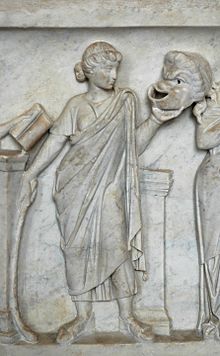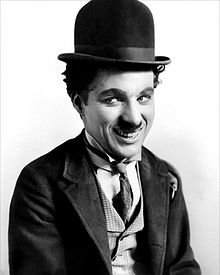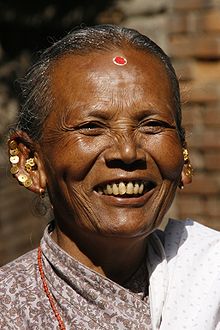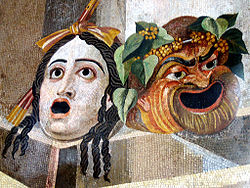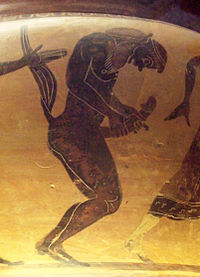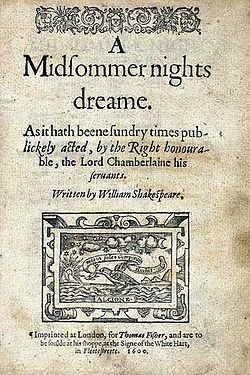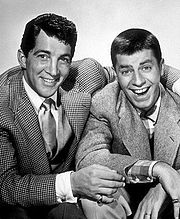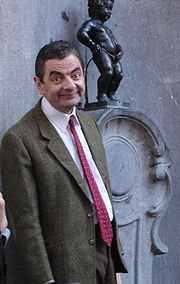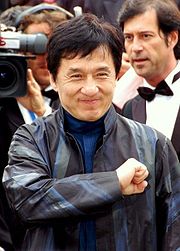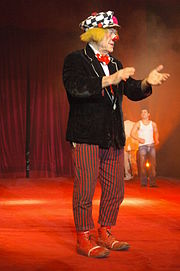- Comedy
-
This article is about a genre of dramatic works. For other uses, see Comedy (disambiguation). For the popular meaning of the term "comedy", see Humour.
Comedy (from the Greek: κωμῳδία, kōmōidía), as a popular meaning, is any humorous discourse or work generally intended to amuse by creating laughter, especially in television, film, and stand-up comedy. This must be carefully distinguished from its academic definition, namely the comic theatre, whose Western origins are found in Ancient Greece. In the Athenian democracy, the public opinion of voters was remarkably influenced by the political satire performed by the comic poets at the theaters.[1] The theatrical genre can be simply described as a dramatic performance which pits two societies against each other in an amusing agon or conflict. Northrop Frye famously depicted these two opposing sides as a "Society of Youth" and a "Society of the Old",[2] but this dichotomy is seldom described as an entirely satisfactory explanation. A later view characterizes the essential agon of comedy as a struggle between a relatively powerless youth and the societal conventions that pose obstacles to his hopes; in this sense, the youth is understood to be constrained by his lack of social authority, and is left with little choice but to take recourse to ruses which engender very dramatic irony which provokes laughter.[3] Much comedy contains variations on the elements of surprise, incongruity, conflict, repetitiveness, and the effect of opposite expectations, but there are many recognized genres of comedy.
Satire and political satire use ironic comedy to portray persons or social institutions as ridiculous or corrupt, thus alienating their audience from the object of humor. Satire is a type of comedy. Parody borrows the form of some popular genre, artwork, or text but uses certain ironic changes to critique that form from within (though not necessarily in a condemning way). Screwball comedy derives its humor largely from bizarre, surprising (and improbable) situations or characters. Black comedy is defined by dark humor that makes light of so called dark or evil elements in human nature. Similarly scatological humor, sexual humor, and race humor create comedy by violating social conventions or taboos in comic ways. A comedy of manners typically takes as its subject a particular part of society (usually upper class society) and uses humor to parody or satirize the behavior and mannerisms of its members. Romantic comedy is a popular genre that depicts burgeoning romance in humorous terms, and focuses on the foibles of those who are falling in love.
Contents
Etymology
The word "comedy" is derived from the Classical Greek κωμῳδία kōmōithía, which is a compound either of κῶμος kômos (revel) or κώμη kṓmē (village) and ᾠδή ōidḗ (singing); it is possible that κῶμος itself is derived from κώμη, and originally meant a village revel. The adjective "comic" (Greek κωμικός kōmikós), which strictly means that which relates to comedy is, in modern usage, generally confined to the sense of "laughter-provoking".[4] Of this, the word came into modern usage through the Latin comoedia and Italian commedia and has, over time, passed through various shades of meaning.[5]
Greeks and Romans confined the word "comedy" to descriptions of stage-plays with happy endings. In the Middle Ages, the term expanded to include narrative poems with happy endings and a lighter tone. In this sense Dante used the term in the title of his poem, La Divina Commedia. As time progressed, the word came more and more to be associated with any sort of performance intended to cause laughter.[5] During the Middle Ages, the term "comedy" became synonymous with satire, and later humour in general, after Aristotle's Poetics was translated into Arabic in the medieval Islamic world, where it was elaborated upon by Arabic writers and Islamic philosophers, such as Abu Bischr, his pupil Al-Farabi, Avicenna, and Averroes. Due to cultural differences, they disassociated comedy from Greek dramatic representation and instead identified it with Arabic poetic themes and forms, such as hija (satirical poetry). They viewed comedy as simply the "art of reprehension", and made no reference to light and cheerful events, or troublous beginnings and happy endings, associated with classical Greek comedy. After the Latin translations of the 12th century, the term "comedy" thus gained a more general semantic meaning in medieval literature.[6]
In the late 20th century, emerged among scholars the tendency to pragmatically prefer the term laughter to comprehensively refer to the whole gamut of the comic, to avoid the classification in ambiguous and problematically defined genres and fields like humour, grotesque, irony, satire.[7][8]
History
Dionysiac origins and Aristophanes
Starting from 425 BCE, Aristophanes, a comic playwright and satirical author of the Ancient Greek Theater wrote 40 comedies, 11 of which survive and are still being performed. Aristophanes developed his type of comedy from the earlier satyr plays, which were shamelessly obscene.[9] Of the satyr plays only survive examples by Euripides which are not representative of the genre.[10] In ancient Greece, comedy originated in bawdy and ribald songs or recitations apropos of phallic processions and fertility festivals or gatherings.[11] According to some,[who?] the original phallic songs also made fun at other people or stereotypes.[citation needed][dubious ]
Around 335 BCE, philosopher Aristotle, in his work Poetics, stated that comedy originated in Phallic processions and the light treatment of the otherwise base and ugly. He also adds that the origins of comedy are obscure because it was not treated seriously from its inception.[12] That said, comedy had its own Muse: Thalia.
Also in Poetics, Aristotle defined Comedy as one of the original four genres of literature. The other three genres are tragedy, epic poetry, and lyric poetry. Literature in general is defined by Aristotle as a mimesis, or imitation of life. Comedy is the third form of literature, being the most divorced from a true mimesis. Tragedy is the truest mimesis, followed by epic poetry, comedy and lyric poetry. The genre of comedy is defined by a certain pattern according to Aristotle's definition. All comedies begin with a low, typically with an "ugly" guy who cannot do anything right. By the end of the story or play, the "ugly" guy has won the "pretty" girl, or achieved some other goal. Comedies usually also have elements of the supernatural, typically magic and, for the Ancient Greeks, the gods. Comedy includes the unrealistic in order to portray the realistic. For the Greeks, all comedies ended happily which is opposite of tragedy, which ends sadly.
In ancient Sanskrit drama
After 200 BCE, in ancient Sanskrit drama, Bharata Muni's Natya Shastra defined humour (hāsyam) as one of the nine nava rasas, or principle rasas (emotional responses), which can be inspired in the audience by bhavas, the imitations of emotions that the actors perform. Each rasa was associated with a specific bhavas portrayed on stage. In the case of humour, it was associated with mirth (hasya).
Shakespearean and Elizabethan comedy
"Comedy", in its Elizabethan usage, had a very different meaning from modern comedy. A Shakespearean comedy is one that has a happy ending, usually involving marriages between the unmarried characters, and a tone and style that is more light-hearted than Shakespeare's other plays.[13]
After the 19th century
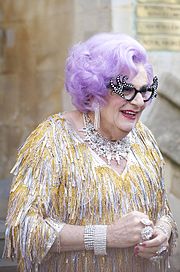 Barry Humphries in character in London as "Dame Edna Everage" on the day of the 2011 Wedding of Prince William and Kate Middleton.
Barry Humphries in character in London as "Dame Edna Everage" on the day of the 2011 Wedding of Prince William and Kate Middleton.
The advent of cinema in the late 19th century, and later radio and television in the 20th century broadened the access of comedians to the general public. Charlie Chaplin, through silent film, became one of the best known faces on earth. The silent tradition lived on well in to the 20th century through mime artists like Marcel Marceau, and the physical comedy of artists like Rowan Atkinson as Mr Bean. The tradition of the circus clown also continued, with such as Bozo the Clown in the United States and Oleg Popov in Russia. Radio provided new possibilities - with Britain producing the influential Goon Show after the Second World War. American cinema has produced a great number of globally renowned comedy artists, from the Three Stooges, Abbott and Costello, Dean Martin and Jerry Lewis and Bob Hope during the mid-20th century, to performers like George Carlin, Robin Williams and Eddie Murphy at the end of the century. Hollywood attracted many international talents like Canadian comics Dan Aykroyd, Jim Carrey and Mike Myers. Among the most successful non-Hollywood comics was Australian comedian Paul Hogan in character as Crocodile Dundee. Other centres of creative comic activity have been the cinema of Hong Kong, Bollywood and French farce.
American television has also been an influential force in world comedy: with American series like M*A*S*H, Seinfeld, Friends and The Simpsons achieving large followings around the world. British television comedy also remains influential, with quintessential works including Fawlty Towers, Monty Python, Dad's Army, Blackadder and The Office.
Australian satirist Barry Humphries, whose comic creations include the housewife and "gigastar" Dame Edna Everage, For his delivery of Dadaist and absurdist humour to millions, was described by biographer Anne Pender in 2010 as not only "the most significant theatrical figure of our time … [but] the most significant comedian to emerge since Charlie Chaplin".[14]
Studies on the theory of the comic
The phenomena connected with laughter and that which provokes it have been carefully investigated by psychologists. They agreed the predominant characteristics are incongruity or contrast in the object and shock or emotional seizure on the part of the subject. It has also been held that the feeling of superiority is an essential factor: thus Thomas Hobbes speaks of laughter as a "sudden glory". Modern investigators have paid much attention to the origin both of laughter and of smiling, as well as the development of the "play instinct" and its emotional expression.
George Meredith, in his 1897 classic Essay on Comedy, said that "One excellent test of the civilization of a country ... I take to be the flourishing of the Comic idea and Comedy; and the test of true Comedy is that it shall awaken thoughtful laughter." Laughter is said to be the cure to being sick. Studies show that people who laugh more often get sick less.[15][16]
Forms
Comedy may be divided into multiple genres based on the source of humor, the method of delivery, and the context in which it is delivered. The different forms often overlap, and most comedy can fit into multiple genres. Some of the sub-genres of comedy are farce, comedy of manners, burlesque, and satire.
Performing arts
Performing arts Major formsMinor formsGenresDrama · Tragedy · Comedy · Tragicomedy · Romance · Satire · Epic · Lyric
Historical forms
- Ancient Greek comedy, as practiced by Aristophanes and Menander
- Ancient Roman comedy, as practiced by Plautus and Terence
- Burlesque, from Music hall and Vaudeville to Performance art
- Citizen comedy, as practiced by Thomas Dekker, Thomas Middleton and Ben Jonson
- Clowns such as Richard Tarlton, William Kempe, and Robert Armin
- Comedy of humours, as practiced by Ben Jonson and George Chapman
- Comedy of intrigue, as practiced by Niccolò Machiavelli and Lope de Vega
- Comedy of manners, as practiced by Molière, William Wycherley and William Congreve
- Comedy of menace, as practiced by David Campton and Harold Pinter
- comédie larmoyante or 'tearful comedy', as practiced by Pierre-Claude Nivelle de La Chaussée and Louis-Sébastien Mercier
- Commedia dell'arte, as practiced in the twentieth-century by Dario Fo, Vsevolod Meyerhold and Jacques Copeau
- Farce, from Georges Feydeau to Joe Orton and Alan Ayckbourn
- Jester
- Laughing comedy, as practiced by Oliver Goldsmith and Richard Brinsley Sheridan
- Restoration comedy, as practiced by George Etherege, Aphra Behn and John Vanbrugh
- Sentimental comedy, as practiced by Colley Cibber and Richard Steele
- Shakespearean comedy, as practiced by William Shakespeare
- Stand-up comedy
- Dadaist and Surrealist performance, usually in cabaret form
- Theatre of the Absurd, used by some critics to describe Samuel Beckett, Harold Pinter, Jean Genet and Eugène Ionesco[17]
- Sketch comedy
Plays
- Comic theatre
- Musical comedy and palace
Opera
Improvisational comedy
- Improvisational theatre
- Bouffon comedy
- Clowns
Joke
Stand-up comedy
Stand-up comedy is a mode of comic performance in which the performer addresses the audience directly, usually speaking in their own person rather than as a dramatic character.
Events and awards
- British Comedy Awards
- Canadian Comedy Awards
- Cat Laughs Comedy Festival
- The Comedy Festival, in Aspen, formerly the HBO Comedy Arts Festival
- Comedy Walk, monthly comedy festival in Los Angeles
- Edinburgh Festival Fringe
- Edinburgh Comedy Festival
- Halifax Comedy Festival
- Just for laughs festival
- Leicester Comedy Festival
- Melbourne International Comedy Festival
- New Zealand International Comedy Festival
- New York Underground Comedy Festival
- HK International Comedy Festival
- Vancouver Comedy Festival
List of comedians
- List of stand-up comedians
- List of musical comedians
- List of Australian comedians
- List of British comedians
- List of Canadian comedians
- List of Finnish comedians
- List of German language comedians
- List of Indian comedians
- List of Italian comedians
- List of Mexican comedians
- List of Puerto Rican comedians
Mass media
Literature Major formsNovel · Poem · Drama
Short story · NovellaGenres Epic · Lyric · Drama
Romance · Satire
Tragedy · Comedy
TragicomedyMedia Performance (play) · Book
Techniques History and lists Outline of literature
Index of terms
History · Modern history
Books · Writers
Literary awards · Poetry awardsDiscussion Literature
Film
Television and radio
Lists of comedy television programs
- British sitcom
- British comedy
- Comedy Central - A television channel devoted strictly to comedy.
- German television comedy
- List of British TV shows remade for the American market
- Paramount Comedy (Spain).
- Paramount Comedy 1 and 2.
- TBS (TV network)
- The Comedy Channel (Australia)
- The Comedy Channel (UK)
- The Comedy Channel (USA) not to be confused with HA! - channels that have merged into Comedy Central.
- The Comedy Network, a Canadian TV channel.
- G.O.L.D
See also
- List of comedies
- Humour
- Australia comedy
- List of genres
References
Footnotes
- ^ Henderson, J. (1993) Comic Hero versus Political Elite pp.307-19 in Sommerstein, A.H.; S. Halliwell, J. Henderson, B. Zimmerman, ed (1993). Tragedy, Comedy and the Polis. Bari: Levante Editori.
- ^ (Anatomy of Criticism, 1957)
- ^ (Marteinson, 2006)
- ^ Cornford (1934)[page needed]
- ^ a b Oxford English Dictionary
- ^ Webber, Edwin J. (January 1958). "Comedy as Satire in Hispano-Arabic Spain". Hispanic Review (University of Pennsylvania Press) 26 (1): 1–11. doi:10.2307/470561. http://jstor.org/stable/470561
- ^ Herman Braet, Guido Latré, Werner Verbeke (2003) Risus mediaevalis: laughter in medieval literature and art p.1 quotation:
The deliberate use by Menard of the term 'le rire' rather than 'l'humour' reflects accurately the current evidency to incorporate all instances of the comic in the analysis, while the classification in genres and fields such as grotesque, humour and even irony or satire always poses problems. The terms humour and laughter are therefore pragmatically used in recent historiography to cover the entire spectrum.
- ^ Ménard, Philippe (1988) Le rire et le sourire au Moyen Age dans la litterature et les arts. Essai de problématique in Bouché, T. and Charpentier, H. (eds., 1988) Le rire au Moyen Âge, Actes du colloque international de Bordeaux, pp.7-30
- ^ Aristophanes (1996) Lysistrata, Introduction, p.ix, published by Nick Hern Books
- ^ Reckford, Kenneth J. (1987) Aristophanes' Old-and-new Comedy: Six essays in perspective p.105
- ^ Cornford, F.M. (1934) The Origin of Attic Comedy pp.3-4 quotation:
That Comedy sprang up and took shape in connection with Dionysiac or Phallic ritual has never been doubted.
- ^ Aristotle, Poetics, lines beginning at 1449a
- ^ Regan, Richard. "Shakespearean comedy"
- ^ http://www.brisbanetimes.com.au/entertainment/books/absurd-moments-in-the-frocks-of-the-dame-20100914-15ar3.html
- ^ LENNY BRUCE (continued from cover) The Realist No. 15, February 1960
- ^ Essay on Comedy, Comic Spirit, by George Meredith from the Encyclopedia of the Self, by Mark Zimmerman
- ^ This list was compiled with reference to The Cambridge Guide to Theatre (1998).
Notations
- Aristotle. Poetics.
- Buckham, Philip Wentworth (1827). Theatre of the Greeks. http://books.google.com/?id=IjAZAAAAYAAJ&printsec=frontcover&dq=The+Theatre+of+the+Greeks.
- Marteinson, Peter (2006). On the Problem of the Comic: A Philosophical Study on the Origins of Laughter. Ottawa: Legas Press. http://www.chass.utoronto.ca/french/as-sa/editors/origins.html.
- Pickard-Cambridge, Sir Arthur Wallace
- Dithyramb, Tragedy, and Comedy , 1927.
- The Theatre of Dionysus in Athens, 1946.
- The Dramatic Festivals of Athens, 1953.
- Raskin, Victor (1985). The Semantic Mechanisms of Humor.
- Riu, Xavier (1999). Dionysism and Comedy. http://ccat.sas.upenn.edu/bmcr/2000/2000-06-13.html.
- Sourvinou-Inwood, Christiane (2003). Tragedy and Athenian Religion. Oxford University Press.
- Trypanis, C.A. (1981). Greek Poetry from Homer to Seferis. University of Chicago Press.
- Wiles, David (1991). The Masked Menander: Sign and Meaning in Greek and Roman Performance.
External links
- Comedy at the Open Directory Project
- A Vocabulary for Comedy from a professor at Dallas Baptist University
Comedy Topics Comedian · Comedy (drama) · Humour · Satire · Irony · Device · Timing · Wit · Joke · Word play · Visual gag · Prank call · Impersonator · Impressionist · Club · FestivalTypes Album · Double act · Guerrilla improv · Improvisational · Manzai · Music (Rock) · Novel · One-person show · Opera · Pantomime · Radio · Roast · Stand-up · Television (Sitcom)Subgenres Alternative · Black · Blue · Character · Christian · Comedy-drama · Cringe · Documentary · High / Low · Horror · Insult · Observational · Physical · Property · Science fiction · Shock · Sick · Sketch · Slapstick · Surreal · Tragicomedy · Zombie Category ·
Category ·  Portal ·
Portal ·  WikiProjectCategories:
WikiProjectCategories:
Wikimedia Foundation. 2010.

